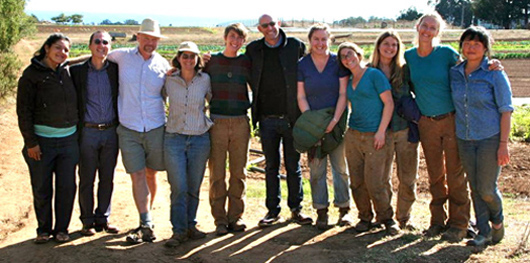Campus News
CASFS hosts author Michael Pollan before Santa Cruz benefit appearance
Author and UC Berkeley journalism professor Michael Pollan visited the UC Santa Cruz Farm on October 25 before taking part in the “Everybody Eats” benefit panel discussion later that evening at Santa Cruz High School.


Author and UC Berkeley journalism professor Michael Pollan visited the UC Santa Cruz Farm on October 25 before taking part in the “Everybody Eats” benefit panel discussion later that evening at Santa Cruz High School.
Pollan, long interested in UCSC’s Center for Agroecology & Sustainable Food Systems (CASFS), said he accepted the invitation to join the panel because it gave him an opportunity for his first visit to UCSC and the Farm. Pollan is best known for writing on food and food politics, including the best-selling Omnivore’s Dilemma.
He heard firsthand about the CASFS apprenticeship program that trains new organic farmers and gardeners, and other activities based at UCSC’s farm and garden sites. Representatives from CASFS, the Life Lab garden education program, and UCSC’s Food Systems Working Group hosted a luncheon prepared by staff and high school students from Life Lab’s “Food What!?” youth empowerment program.
Joining Pollan were other panel members, including Randall Grahm, founder of Bonny Doon Vineyards, Jamie Smith, Food Service director at Santa Cruz City Schools, and Darrie Ganzhorn, executive director of the Homeless Garden Project.
Guests learned about the many projects taking place both on and off campus aimed at improving farmworker conditions, nutrition and science education, campus food system sustainability, and school food programs.
After lunch, the group toured the farm with CASFS executive director Daniel Press and heard from CASFS staff members Liz Milazzo and Christof Bernau about the ecological horticulture program, which has trained more than 1,400 apprentices in the skills and knowledge of organic farming and gardening, as well as social issues associated with developing a sustainable food system.
CASFS also hosts research on organic farming techniques, including a USDA-funded project to find alternatives to methyl bromide fumigation for strawberry production, as well as classes and internships for UCSC students, and an annual series of community gardening workshops.